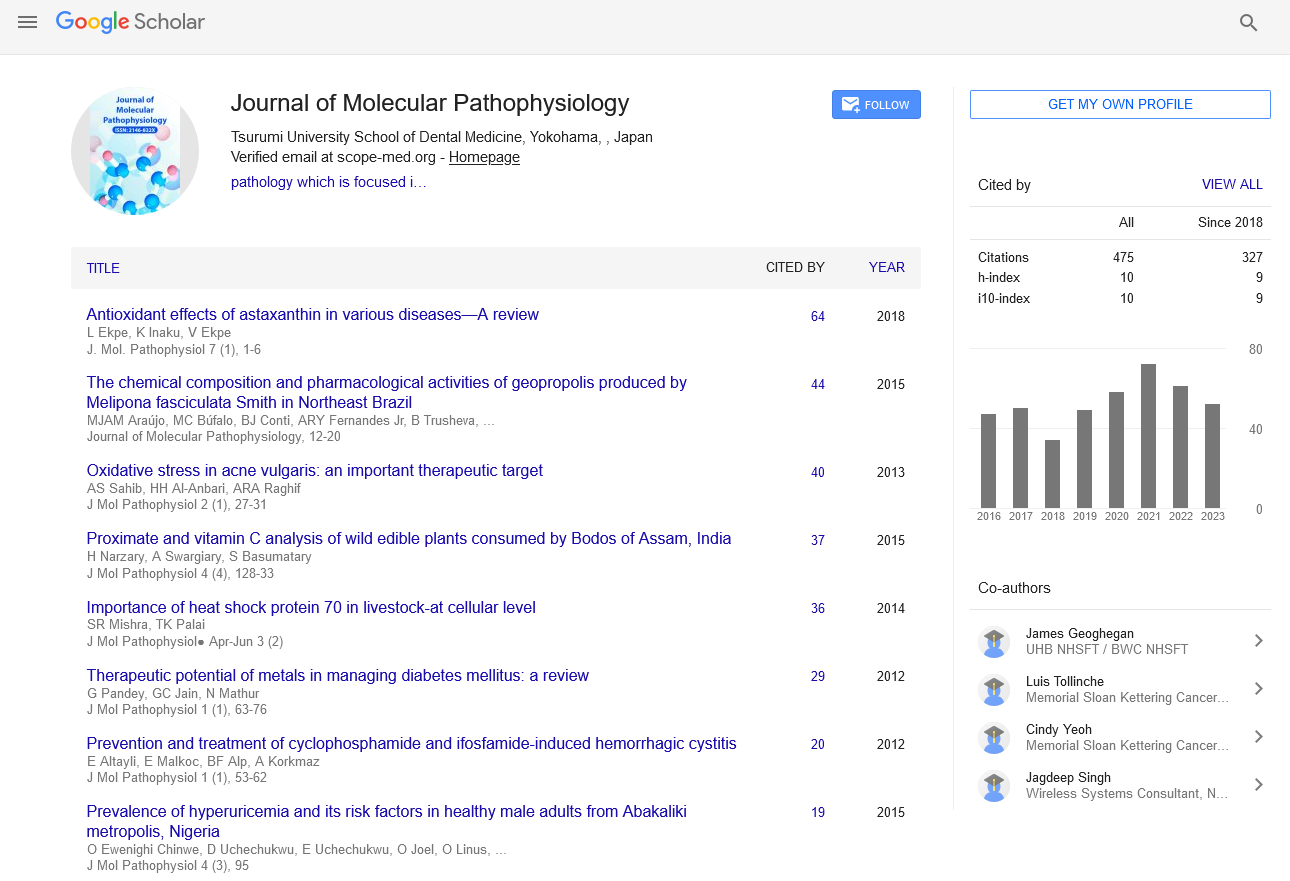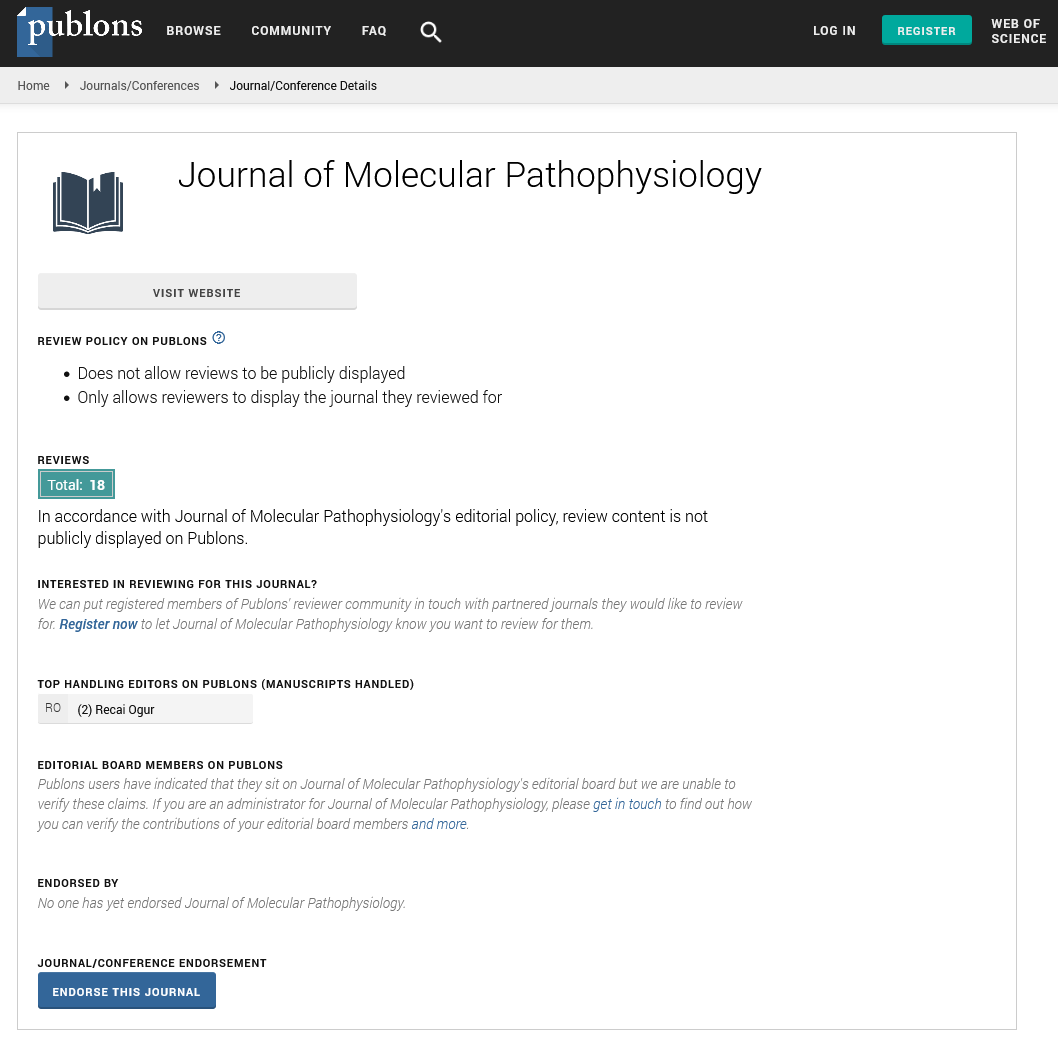Perspective - Journal of Molecular Pathophysiology (2024)
Complex Relationship between Human Disease Susceptibility and Single Nucleotide Polymorphisms
Christo Carey*Christo Carey, Department of Molecular and Cellular Biology, Harvard University, Cambridge, USA, Email: christocarey66@yahoo.com
Received: 15-Apr-2024, Manuscript No. JMOLPAT-24-139520; Editor assigned: 18-May-2024, Pre QC No. JMOLPAT-24-139520 (PQ); Reviewed: 03-May-2024, QC No. JMOLPAT-24-139520; Revised: 10-May-2024, Manuscript No. JMOLPAT-24-139520 (R); Published: 17-May-2024
About the Study
In humans, Single Nucleotide Polymorphisms (SNPs) are the most prevalent kind of genetic variation. Every SNP indicates a variation in a single nucleotide, which is a unit of DNA. SNPs are found in every segment of a person's DNA and generally occur one in every 300 nucleotides. While many SNPs have no effect on health or development, some of these genetic variations can predispose individuals to disease or influence their response to drugs. SNPs can be present in both the genome's coding and non-coding categories. Coding SNPs are found within the coding sequences of genes and can affect the protein structure by altering amino acid sequences. Non-coding SNPs may affect gene regulation and expression. SNPs are important because they can affect therapeutic response, illness susceptibility, and phenotypic variability.
SNPs in coding regions can lead to amino acid substitutions that alter the function or stability of the resulting protein. For example, a SNP in the gene encoding for the protein beta-globin causes a single amino acid change, leading to sickle cell disease. This single nucleotide change results in hemoglobin molecules that aggregate abnormally, causing red blood cells to adopt a sickle shape and leading to various health complications. SNPs located in regulatory regions, such as promoters, enhancers, or introns, can affect the binding of transcription factors and other proteins that regulate gene expression. An example is the SNP in the promoter region of the MDM2 gene, which affects the binding affinity of transcription factors and increases the expression of MDM2, a negative regulator of the p53 tumor suppressor pathway. This increased expression is associated with accelerated tumor formation in certain cancers.
SNPs within introns or at exon-intron boundaries can affect the splicing of pre-mRNA, leading to the inclusion or exclusion of certain exons in the final mRNA. This can produce different protein isoforms with varying functions. For instance, certain SNPs are known to cause aberrant splicing of the BRCA1 gene, which is linked to an increased risk of breast and ovarian cancers. The SNP rs1333049 on chromosome 9p21 is one of the most replicated genetic markers associated with Coronary Artery Disease (CAD) and myocardial infarction. It has been shown that those with the risk variant are far more likely to acquire CAD.
The TCF7L2 gene contains a SNP (rs7903146) that has been associated with an increased risk of type 2 diabetes. The risk allele is believed to affect insulin secretion and glucose metabolism. SNPs in the Human Leukocyte Antigen (HLA) region are associated with various autoimmune diseases. For instance, specific SNPs in the HLA-DQ and HLA-DR genes are linked to an increased risk of type1 diabetes and celiac disease. Numerous SNPs have been identified that are associated with an increased risk of various cancers.
Technological advances in genomics have greatly facilitated SNP research. High-throughput genotyping technologies, such as SNP arrays and next-generation sequencing, have enabled the identification and analysis of millions of SNPs in large populations. Genome Wide Association Studies (GWAS) have been instrumental in identifying SNPs associated with various diseases by comparing the genomes of individuals with and without a particular disease. Genetic testing for specific SNPs can provide valuable information about an individual’s risk for certain diseases, allowing for early intervention and personalized treatment plans. For example, individuals with a high genetic risk for cardiovascular diseases may benefit from more aggressive lifestyle interventions and monitoring. Pharmacogenomics is another important application, where knowledge of SNPs can guide drug therapy. SNPs in genes encoding drug-metabolizing enzymes, drug targets, and drug transporters can influence an individual’s response to medications. For instance, the presence of certain SNPs in the CYP2C9 and VKORC1 genes can affect the metabolism and efficacy of the anticoagulant drug warfarin, necessitating dosage adjustments.







